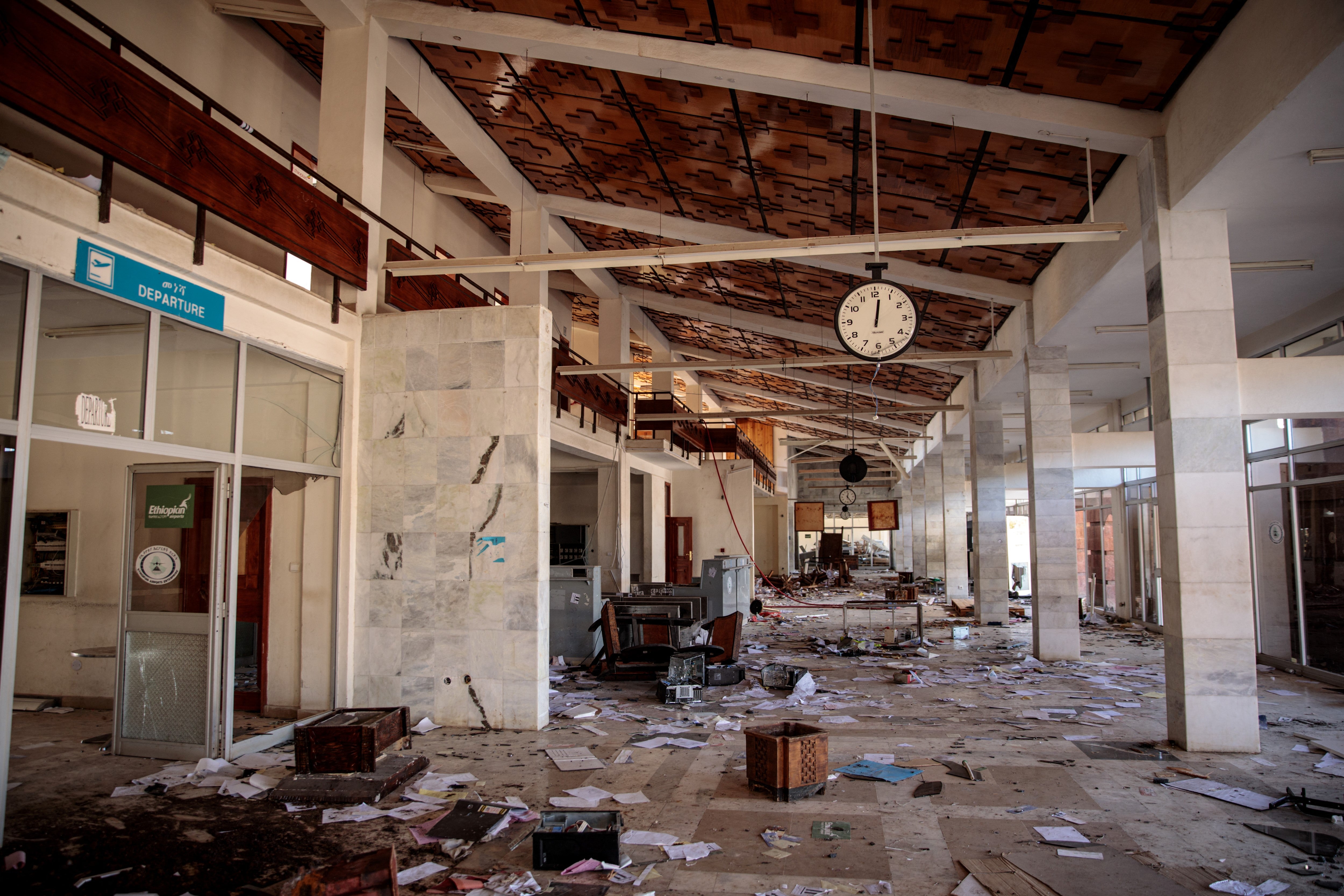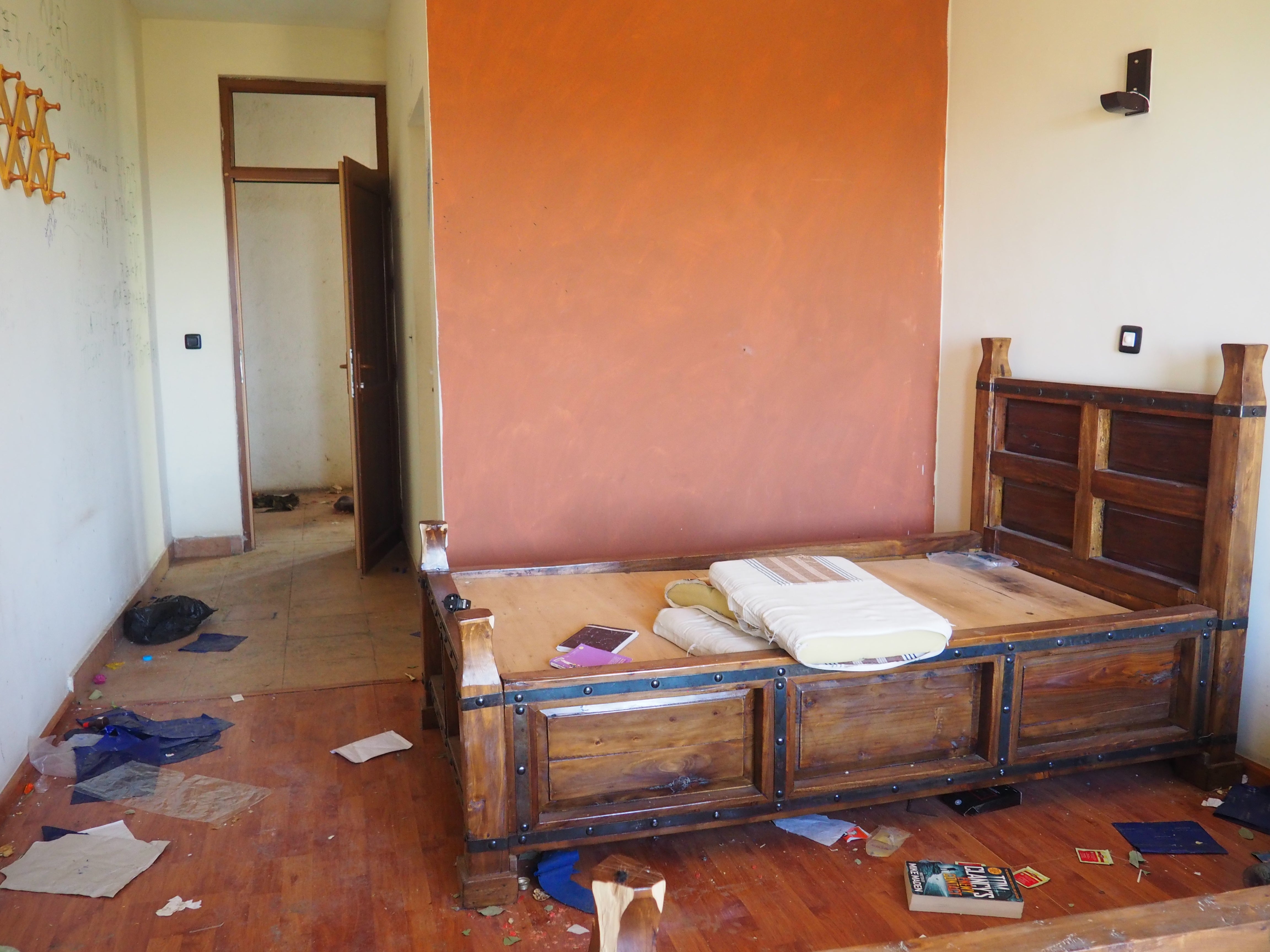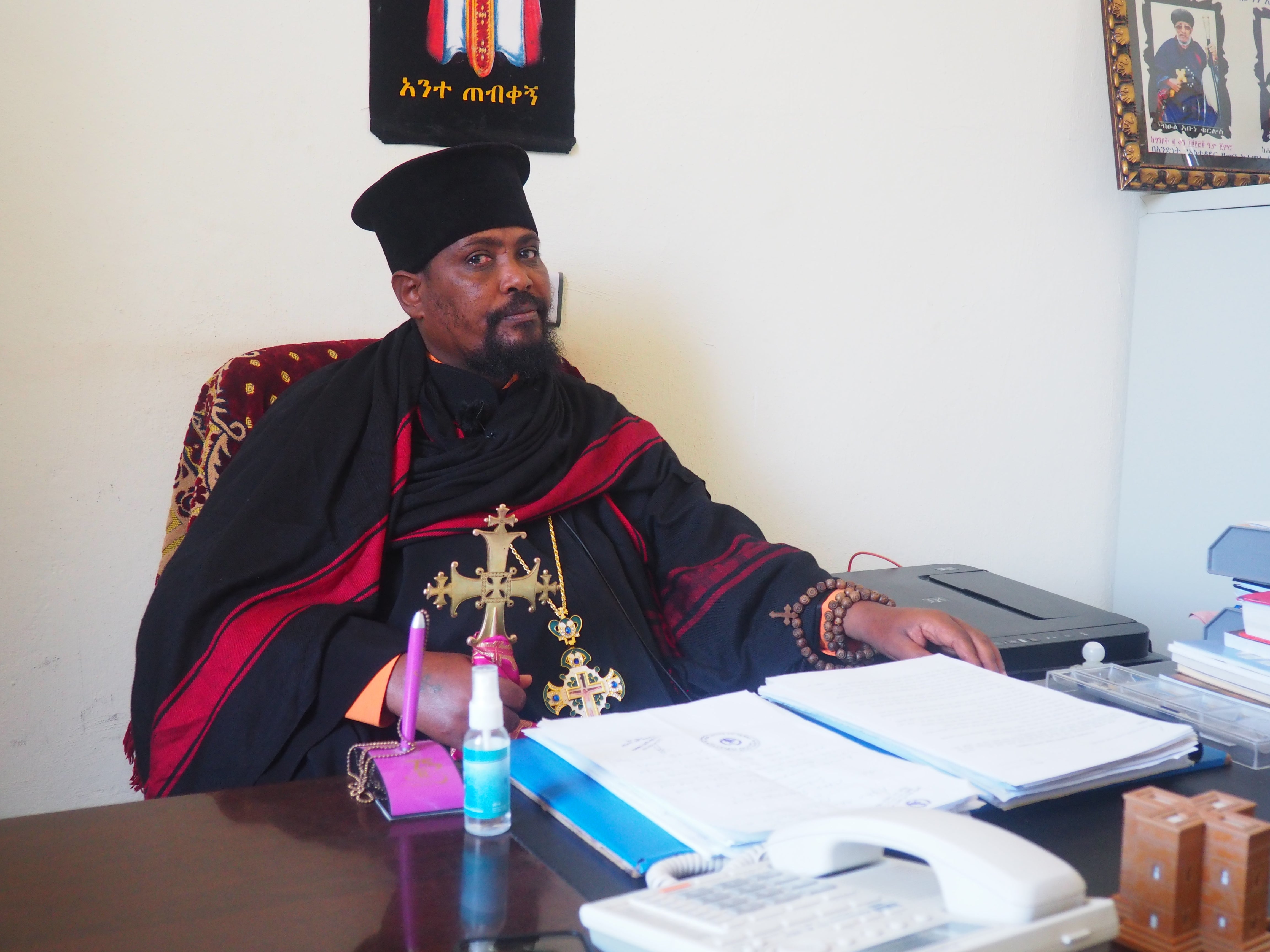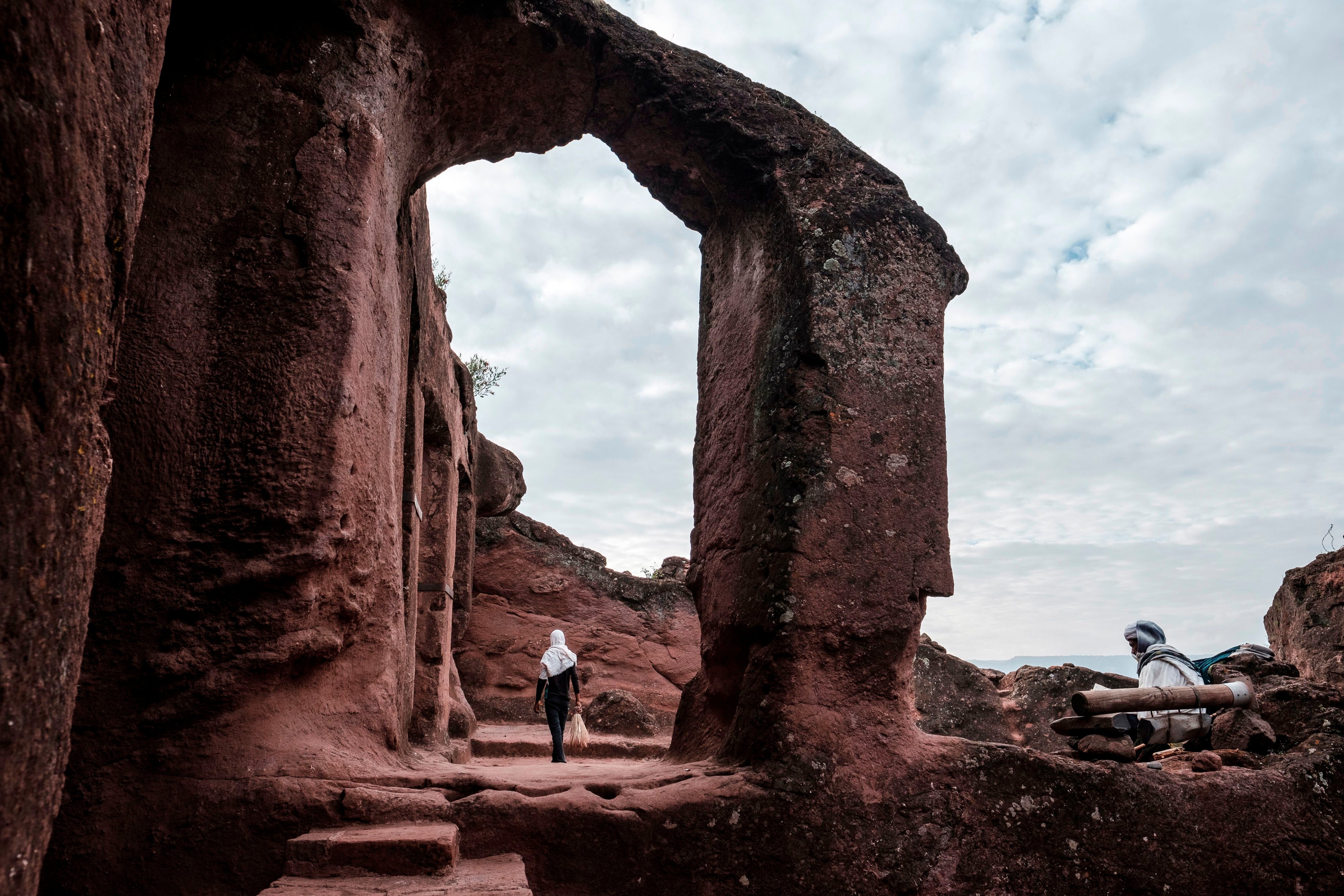Coronavirus and civil war spell trouble for tourism in Ethiopia’s holy town of Lalibela
Ethiopia’s top tourist destination is hoping to welcome back visitors, after Covid battered the sector and conflict left hotels and businesses in ruins, reports Fred Harter

In better times, the cobbled streets of Lalibela in northern Ethiopia hummed with foreign tourists drawn to its ancient rock-hewn churches. Today, there are none.
The historic town has been emptied of sightseers by the coronavirus pandemic and civil war, and it is young men carrying rifles, rather than tourists, who now loiter outside local souvenir shops.
“It has been very difficult,” says Addis Solomon, 36, who owns a weaving shop selling scarves and other fabrics in the centre of Lalibela.
“We used to have many tourists, but now there are none in town at all. I am surviving by selling to the local people,” he tells The Independent.
Before the onset of the pandemic, Ethiopia was widely tipped to become one of the world’s hottest new tourist destinations.
A few years earlier, dynamic young leader Abiy Ahmed, 45, had swept to power and set off a raft of reforms that seemed to signal an end to decades of conflict, poverty, and repressive rule.
His government heavily promoted Ethiopia as the “Land of Origins”, playing on its reputation as the cradle of human evolution. The holy town of Lalibela was the centrepiece of this promotional push, with its 11 Unesco-listed churches, each cut from a single piece of rock. Local lore states they were built by a 12th-century king, called Lalibela, to create a pilgrimage site that would rival Jerusalem.
For centuries the town was a remote outpost, nestled in a forbidding mountain range, but in 1997 Lalibela was opened up by a new airport, and by 2020 it had become Ethiopia’s most popular tourist destination by far, attracting about 50,000 visitors a year.
Covid-induced travel restrictions in early 2020 brought the growth of this nascent tourism sector to an abrupt halt, leaving Lalibela’s hundreds of tour guides out of work and forcing many to rely on donations, either from relatives or from tourists who had previously paid for their services.

Then, in November 2020, just as things were starting to open up again, a brutal war broke out in the north of the country – pitting the federal government against the Tigray People’s Liberation Front (TPLF).
The conflict has been marked by accusations of massacres, mass rape, and ethnic cleansing, with reports of atrocities on both sides.
Late last year, as the TPLF advanced towards the capital, Addis Ababa, countries including the US and the UK advised their nationals not to travel to Ethiopia and warned those already there to leave immediately, amid fears that the violence could escalate and sweep across the whole country.
Abiy has lost his once-stellar reputation as a Nobel Peace Prize-winning reformer, and has become better known on the international stage as a war leader who rails against what he calls foreign conspiracies and fends off accusations of crimes against humanity.
The fighting reached Lalibela in August, when it was captured by the TPLF rebels. The airport and local hospital were trashed, while several of the upmarket hotels were stripped bare.
More than 20 hotels in the town are believed to have been looted and ruined.
The town is slowly getting back on its feet after the rebels were forced to retreat to the northern region of Tigray in late December. It is peaceful now, but it is still unclear when the tourists who provide the city’s lifeblood will return, and local business owners are worried.
Mountain View, a hotel that commands stunning panoramas of the mountains surrounding Lalibela, is one of several commercial properties used as a base by the rebels during their five-month occupation of the town.
On a visit to the hotel last month, it was apparent that rooms had been emptied of their furniture, while pro-TPLF graffiti covered the walls, and piles of empty beer bottles littered the floor of the bar.

The hotel’s owner, Getachew Tekeba, estimates the cost of the damage to be around £600,000 – a manageable sum if he could secure a government-backed loan. The tourism ministry has said it will help him rebuild, but for now he still has no funds to pay his 55 staff, who are out of work.
“Before Covid, everything was booming and we had a lot of customers. This was one of the best spots for tourists,” says Getachew, standing in the ruins of his wrecked hotel. “Now we have no clue what we are going to do.”
Still, Getachew was luckier than some other hoteliers.
The hotel next door to his, Cliff Edge, which was also occupied by the rebels, was hit by a government drone strike that targeted a group of TPLF commanders meeting there in December. In January, its lobby was still strewn with shattered glass and blood was splattered on its outer walls.
The churches, holy sites for both the federal fighters and the rebels, survived unscathed, just as they have withstood centuries of turmoil in this part of northern Ethiopia.
Lalibela’s archbishop, Tsige Mezgebu, tells The Independent that he negotiated with the TPLF rebels and persuaded them not to position their artillery pieces near the structures.
“I also begged them, along with other priests, not to destroy institutions that provide services for the community,” says Tsige. “People came to us, running from them. There were some [rebel] leaders who came to the churches to pray and receive blessings, but there were many bad ones who looted and did wrong things.”

Mark Chapman, the British owner of Tesfa Tours – a community-based tour company – says he used to take in the region of 400 groups of tourists a year to the area surrounding Lalibela.
“I can count with my hands the number of groups we took in 2021,” he says, adding that he has had to deter some visitors planning trips to northern Ethiopia who were unaware of the conflict.
However, Mr Chapman believes the pandemic and the conflict offer Lalibela the chance to reset, and to do things differently.
Previously, the tourism sector was chaotic, and the town was overrun by sightseers, he says, with groups queueing to enter churches and jostling for space with local worshippers once inside.
“These places aren’t dead pyramids, these are living religious places with lots of worshippers, and it was a bit worrying to see it become a seething mass of tourists,” Mr Chapman adds.
“Now the tourists have dried up, we might have an opportunity to take stock and look at how to do things better.”

When the TPLF rebels withdrew to Tigray in December, there were hopes of a ceasefire and an end to the war.
But recently there has been renewed fighting along Tigray’s border with Afar, about a day’s drive from Lalibela, and Tigray itself remains cut off from the rest of Ethiopia. No aid has entered the region since 14 December, and the UN believes 400,000 people there are on the brink of famine.
Nonetheless, the government is confident that it can rebuild the damage done to Ethiopia’s international reputation and get the tourism sector back up and running.
A guide for foreign investors, recently released by the tourism ministry, optimistically lists several towns in Tigray as investment opportunities, alongside a host of national parks – and Lalibela.
“Tourism is our main income and people here are struggling to make a living,” says Tesfa Habtie, the local head of the ruling party in Lalibela, sitting in her office. Her computers were looted by the rebels and are yet to be replaced.
“It will be difficult to rebuild. First we have to deal with the trauma the people here experienced during the war. But tourism will come back, definitely.”
Join our commenting forum
Join thought-provoking conversations, follow other Independent readers and see their replies
Comments


Bookmark popover
Removed from bookmarks